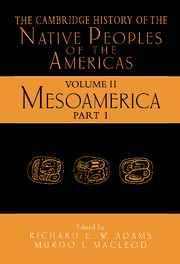Book contents
- Frontmatter
- Contents
- List of Illustrations
- Part I
- 1 Introduction to a Survey of the Native Prehistoric Cultures of Mesoamerica
- 2 The Paleoindian and Archaic Cultures of Mesoamerica
- 3 The Preclassic Societies of the Central Highlands of Mesoamerica
- 4 The Precolumbian Cultures of the Gulf Coast
- 5 The Maya Lowlands: Pioneer Farmers to Merchant Princes
- 6 The Central Mexican Highlands from the Rise of Teotihuacan to the Decline of Tula
- 7 Western and Northwestern Mexico
- 8 Cultural Evolution in Oaxaca: The Origins of the Zapotec and Mixtec Civilizations
- 9 The Southeast Frontiers of Mesoamerica
- 10 The Maya Highlands and the Adjacent Pacific Coast
- 11 The Aztecs and Their Contemporaries: The Central and Eastern Mexican Highlands
- Index
1 - Introduction to a Survey of the Native Prehistoric Cultures of Mesoamerica
Published online by Cambridge University Press: 28 March 2008
- Frontmatter
- Contents
- List of Illustrations
- Part I
- 1 Introduction to a Survey of the Native Prehistoric Cultures of Mesoamerica
- 2 The Paleoindian and Archaic Cultures of Mesoamerica
- 3 The Preclassic Societies of the Central Highlands of Mesoamerica
- 4 The Precolumbian Cultures of the Gulf Coast
- 5 The Maya Lowlands: Pioneer Farmers to Merchant Princes
- 6 The Central Mexican Highlands from the Rise of Teotihuacan to the Decline of Tula
- 7 Western and Northwestern Mexico
- 8 Cultural Evolution in Oaxaca: The Origins of the Zapotec and Mixtec Civilizations
- 9 The Southeast Frontiers of Mesoamerica
- 10 The Maya Highlands and the Adjacent Pacific Coast
- 11 The Aztecs and Their Contemporaries: The Central and Eastern Mexican Highlands
- Index
Summary
This section both introduces the chapters of my colleagues that follow and is an attempt to outline the intellectual context within which the work and thought have been accomplished. A short historical background is also provided as well as a description of the basic theoretical underpinnings of American archaeology.
THE FUNDAMENTAL INTELLECTUAL STRUCTURES OF MESOAMERICAN FIELD ARCHAEOLOGY
The basic theoretical structure of American archaeology is derived from its association with anthropology as well as parts derived from Western scholarly and traditions in general. Briefly, anthropology (and therefore archaeology) argues that most human behavior is patterned and that the patterns are culturally determined. Furthermore, any given culture is made up of such patterned behavior, functionally integrated, and driven by a core of beliefs about the nature of the universe and humanity’s place in it. These disciplinary premises have been distilled from the study of hundreds of cultures, mainly non-Western, over the past 150 years, although Herodotus (c. 425 B.C.) is often claimed as an early anthropologist. All cultural patterns, such as differentiated social status, have material correlates, as witness differential housing. For archaeologists, the important part of this premise is that the material remains of any culture therefore have some relation to the formerly operative nonmaterial behaviors. For example, ancestor veneration among the Maya drove them to create shrines and temples, large and small, which are now found in ruins across the landscape. Analytically, the anthropologist and archaeologist both may artificially break cultures down into component parts called cultural institutions. The use of cultural institutions is not the only means of analysis, but it is a particularly useful concept for archaeology because of the direct logical linkage between institutions and their material remains. Thus ancient irrigation canals reflect not just a farming technique but a segment of a former economic system. Examples of both cultural institutions and their material correlates are provided in Tables I.I and 1.2. Research methods that generate the data are listed in Table 1.3. A final point is that archaeology depends greatly on analogy to ethnographic or historical cultures in order to interpret material remains. A mild dispute exists between those who argue that only the sixteenthcentury Mesoamerican cultures are appropriate analogies and those who cast their nets wider and include parallels from other historical or prehistoric civilizations.
Scholarly tradition in Western civilization has evolved so that it is commonly practiced in three distinct stages.
- Type
- Chapter
- Information
- Publisher: Cambridge University PressPrint publication year: 2000



